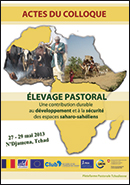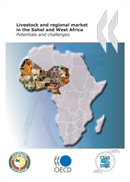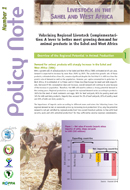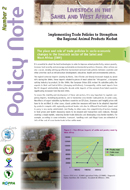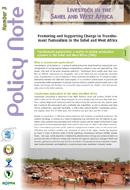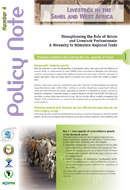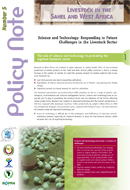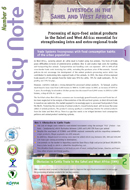Regional symposium on pastoral livestock, N'Djaména (Chad), 27-29 May 2013
"Pastoral farming is a solution against abandoned space and the related risk of instability. It is, at the same time, an answer to social, economic and environmental problems and must therefore be placed at the core of stabilisation strategies and policies." |
Emphasising the need for regional co-operation, the Declaration sends an important message to policymakers responsible for strategies aimed at stabilising and developing the Sahara-Sahelian areas: pastoral farming is a solution against abandoned space and the related risk of instability. It is, at the same time, an answer to social, economic and environmental problems and must therefore be placed at the core of stabilisation strategies and policies.
As pastoral livestock and trade constitute one of the main legal and peaceful activities in the areas concerned, they form a crucial line of defence against insecurity across the region. Through their regular presence in uninhabited zones, transhumant pastoralists limit the physical space available to terrorists and criminal networks and defend against the creation of ungovernable no man’s lands.
To further capitalise on this advantage, the Declaration calls on states and breeders to work together to strengthen the livelihoods and resilience of nomadic communities by placing pastoralism at the core of strategies for development and security. The Declaration identifies four priority areas for action: 1) Improving governance; 2) Strengthening the resilience of pastoral communities; 3) Enhancing the economic sustainability of the pastoral livestock sector; and 4) Enhancing the social sustainability of communities in the Sahara-Sahelian areas.
Recommendations include involving pastoralists in governance and public life, increasing their access to natural resources and basic social services, and strengthening inter-state co-operation to facilitate cross-border mobility. Regional and international stakeholders committed to work toward leveraging pastoral livestock to enhance security and development in the Sahara-Sahelian areas.
Background
Forty years ago, unparalleled droughts put the Sahel under the spotlight of international attention. This series of climate disasters resulted in the massive influx of emergency aid and a desire to better understand the region to prevent future crises. Today, the Saharo-Sahelian region has regained global attention, due to the insecurity plaguing the area. It is perceived as a threat against the stability of the region’s States and against international security. Necessary emergency security responses have been put in place, costing lives and encroaching on national budgets. This context makes the formulation of long-term development solutions difficult, although these will constitute the foundations for the future stability of these areas.
Focus areas
- Retrospective and prospective analyses: in-depth analysis of the history of the Sahara and the Sahel, of its insecurities, its economy and of pastoralism; identification of current and future challenges; reflection on the role of mobility (and by extension, that of pastoral livestock) in the face of transnational threats (the movement of mafia and terrorist groups, illegal trafficking, etc.)
- Analysis of public policies: in-depth analysis of the creation and the modalities of public policies regarding the development of the Saharo-Sahelian areas and the promotion of pastoral livestock
- Proposals for action: proposals for technical and political action for the creation of a strategy that promotes pastoral livestock herding at the centre of the efforts for security and development
Agenda
- 27 May, 2013: Introduction
- Opening statement by Prime Minister Djimrangar Dadnadji
- Introduction to the symposium: pastoral livestock herding and factors of insecurity
- 28 May, 2013: Thematic workshops (carried out simultaneously)
- Workshop 1: Governance and security – challenges and public policy responses
- Workshop 2: Strengthening the resilience of pastoralist communities – challenges and public policy responses
- Workshop 3: Strengthening the economic and social sustainability of pastoralist communities – challenges and public policy responses
- 29 May, 2013: Feedback from the workshops in plenary and closing remarks
- Ministerial Conference (carried out simultaneously) – leading to the Declaration of N’Djaména
Participants
Outcomes
The debates of the symposium served as substantive inputs for the Declaration of Nouakchott - Mobilising jointly an ambitious effort to ensure pastoralism without borders, approved on 29 October 2013 by six Sahelian countries and a multistakeholder alliance led by CILSS and the World Bank, in collaboration with the AU, ECOWAS, FAO and UEMOA. The Nouakchott process calls the Declaration of N’Djaména “a major reference that summarises the existing frameworks and defines the priorities for a policy of support for regional pastoralism closely linking development and security issues.” It also makes reference to the Global Alliance for Resilience – which “places pastoralism among its top priorities.”
APESS - building a network of livestock organsiations
|
|
Interview with Aliou Ibrahima, APESS Secretary-General "The deep-seated changes of traditional pastoral systems require the ability to significantly adapt: demographic growth contributes to intensifying demand and exerts pressure on production capacities; unfair competition from imported meat (dumping) hinders local production’s competitiveness. Indeed, livestock breeders cannot meet these challenges individually; which is why APESS’ mission is so important. The livestock professionals’ strength will depend on their capacity to become mobilised within one powerful livestock movement." |
Documents
- Declaration of Nouakchott - Mobilising jointly an ambitious effort to ensure pastoralism without borders, 29 October 2013
- Guiding principles for the Development of the Livestock Industry within ECOWAS, February 2009
- Final communiqué by ECOWAS Ministers, Regional Livestock Forum, 4 February 2009
- Pastoral development and managing cross-border transhumance, RAIP component, sub-programme on the improved management of other shared resources, volume 2, September 2009 (French)
| Livestock and the regional market in the Sahel and West Africa
This ECOWAS/SWAC study, conducted in collaboration with the CILSS, UEMOA and ROPPA within the framework of the Initiative “Potentials and Challenges for Strengthening the Regional Market”, is part of a strategic thinking process aiming to identify ways and means of enabling the livestock sector to play its role effectively as an engine of economic development in the individual countries and take part in the process of regional economic integration. |
Policy notes
|
Drawing on outcomes of this study, a series of policy notes on the future of livestock has been produced to facilitate decision-making.
|
Useful links
- Benin: Ministry in charge of agriculture, livestock and fisheries (in French)
- Burkina Faso: Ministry in charge of animal resources (in French)
- Chad: Pastoralism Website, managed by the Ministry in charge of animal resources (in French)
- Côte d'Ivoire: Ministry in charge of animal and water resources (in French)
- Gambia (The): Ministry in charge of agriculture
- Ghana: Ministry in charge of agriculture
- Liberia: Ministry in charge of agriculture
- Mali: Ministry in charge of livestock and fisheries (in French)
- Mauritania: Ministry in charge of rural development (in French)
- Nigeria: Department in charge of livestock
- Senegal: Ministry in charge of livestock (in French)
- Togo: Ministry in charge of agriculture, livestock and fisheries (in French)
Related Documents


